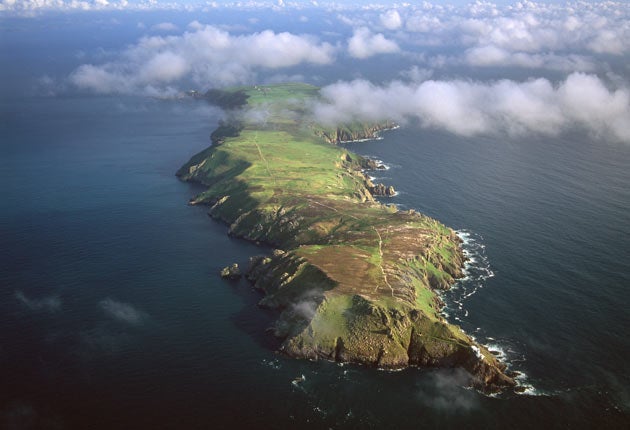The secret of Lundy
This granite island in the Bristol Channel is a haven for humans as well as wildlife. Richard Knight reports

As a child growing up in North Devon, I was always fascinated by Lundy Island. I saw it almost every day: a dark, uneven presence on the horizon. On stormy nights its lighthouses winked at us. Ours winked back. But what happened on that three-mile-long lump of granite? Who were the Lundy Islanders? My juvenile imagination conjured pirates and wreckers, hidden caves and secret tunnels.
When I finally visited Lundy, aged 12, it wasn't as exciting as I had hoped. I spent the two-hour rain-lashed crossing in the ship's hot saloon, wincing at the combined smell of engine oil and vomit. After the long climb from the jetty to the cliff-top, I finally found out what happend on Lundy: almost nothing at all. I dimly recall cagouled tourists moving slowly between austere stone buildings, gazing out over gale-smoothed scrub towards the grey ocean beyond.
This summer, a quarter of a century later, I went back. This time, I wasn't the pouting child but the chivvying father. This time we intended to stay, camping, for three days. And this time, I loved it. I'm still not sure whether the island has changed, or whether I have.
What has changed is the understanding of Lundy's importance. Twenty-five years ago, around the time of my visit, Lundy became Britain's first statutory Marine Nature Reserve. Last year, the island's waters became the first Marine Conservation Zone in England and Wales, a new level of protection created to "conserve nationally important marine wildlife". At the time, Dr Helen Phillips, Natural England's chief executive, described Lundy as "a showcase of what a well-protected marine environment can become".
Many now visit Lundy solely for its wildlife. Divers hope to glimpse a giant basking shark or a pod of dolphins playing in the pristine water. Seals are easily found. Children search rockpools for limpets, anemones and shore crabs.
"Lund-ey" is old Norse for Puffin Island, and puffins still breed there in early summer. Gannets, guillemots, razorbills and oystercatchers are resident for much or all of the year. Skylarks provide the soundtrack to Lundy's summer. The mammalian population is a little more surprising. There are Japanese silka deer and wild Soay sheep, both introduced by an experimental owner decades ago. There are goats, brought to the island by Trinity House to provide meat for its lighthouse-keepers, and shaggy ponies.
But for us it was the wild spaces, rather than wildlife, which most excited. There are no cars on Lundy – just a handful of farm vehicles – and no access restrictions. We could let our toddler son roam almost freely. Chance encounters with ducks, sheep and pigs sent him giggling back to mummy to tell her all about it. What could be more fun for a small boy?
In the late summer sun the buildings I recalled as damp and austere looked honeyed and inviting. There are only a few: a church, a pub, farm and office buildings, a small shop, and a number of properties available for holiday rental. Many were built by the Lundy Granite Company in the 19th century to house and feed its quarry-workers. They are old, solid buildings, constructed from great slabs of stone, and they are immaculate.
What I have observed so far could have been written on the strength of a day-trip. An afternoon on the island is long enough to see that it is a ruggedly beautiful place, and a natural playground for climbers, walkers, divers and young children. But if you stay longer, as we did, then another Lundy emerges; a place which day-trippers cannot see, because it can only be felt.
When the MS Oldenburg – Lundy's own supply ship – pulls away at four in the afternoon, heavy with excursionists, the island itself seems to exhale slowly and relax. Now Lundy belongs only to its 27 staff, and to the fortunate few visitors who thought far enough ahead to secure a rental property, or a berth in the small campsite.
Those early evening hours were, for us, the best. Fellow island-stayers nod and greet one another, smiling, as if sharing a secret, and the darkening sky somehow widens the gap between island and mainland, where real life remains just visible but almost forgotten.
Every community needs its meeting place and for Lundy Islanders, both those who work there year-round and those staying for a just a few nights, that meeting place is the island's pub, the Marisco Tavern. On a tiny island full of good things, the Marisco is one of the best. You might expect its monopoly position to drive standards down and prices up. But that hasn't happened. The food is exceptional. It's also local. Lundy's staff farm and butcher their own chickens, pigs, goats and lambs, and grow a good supply of vegetables, too.
As I write this, I am no longer on Lundy but I can see it. I'm sitting at my laptop in a beach-hut overlooking Woolacombe Sands, where our holiday continues. I no longer think of smugglers and treasure when I see that familiar shape over the water. I don't think of soggy tourists either.
Now I think of three perfect days in an ageless place, where nature provides all the entertainment anyone could need. Now when I see those lighthouses wink, I think they are winking at me, and anyone else who knows the secret of Lundy Island.
Join our commenting forum
Join thought-provoking conversations, follow other Independent readers and see their replies
Comments
Bookmark popover
Removed from bookmarks